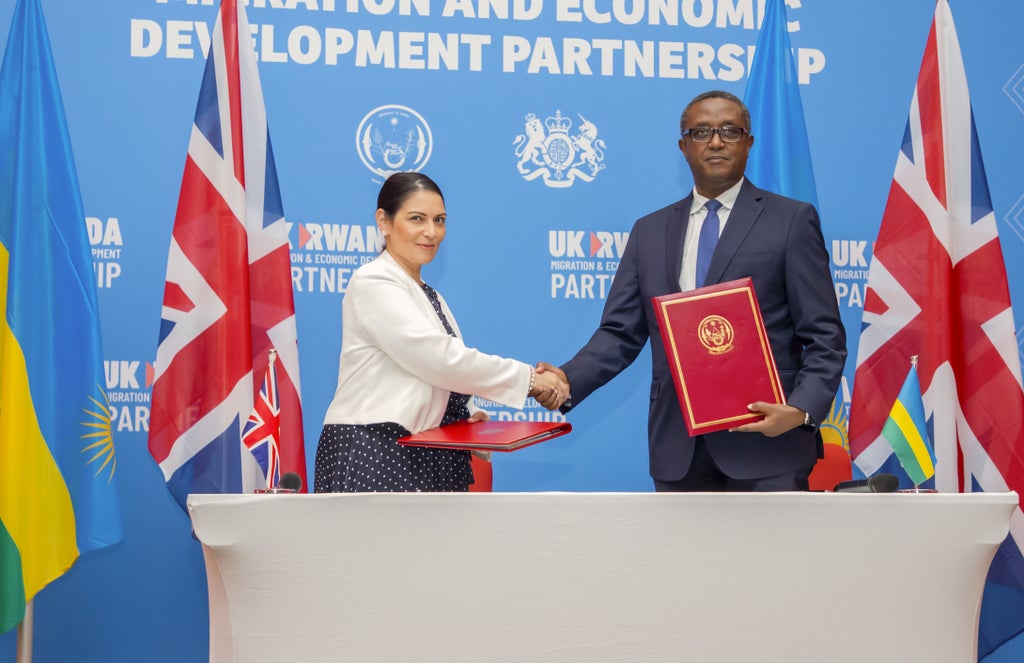
Priti Patel issued a “ministerial direction” after the Home Office’s top civil servant raised objections over the multi-million pound proposal to send asylum seekers to Rwanda for processing.
It comes after the plan − unveiled by Boris Johnson and the home secretary on Thursday − provoked a fierce response from charities and claims it could cost taxpayers between £20,000 and £30,000 for each individual sent to the central African country.
While welcomed by some Conservative MPs, two former cabinet ministers, David Davis and Andrew Mitchell, have raised concerns about the proposal, with the latter describing it as “immoral”, “impractical”, and involving “astronomic” costs.
The Independent also understands that Ms Patel instructed the Home Office to press ahead with the policy – using a “ministerial direction” – despite an objection being raised by the permanent secretary at the department.
According to the Institute for Government (IfG) think tank, a top civil servant in a department has a duty to seek a ministerial direction if they think a proposal breaches criteria, including on legal powers and value for money.
A Home Office source told The Independent: “The asylum system is costing the taxpayer over £1.5bn per year – the highest amount in over two decades, and we are spending £4.7m on hotels per day between those who have arrived illegally and through resettlement programmes.
“Home Office officials are clear that deterring illegal entry would create significant savings. However, such a deterrent effect cannot be quantified with certainty.
“It would be wrong to let a lack of precise modelling delay a policy aimed at reducing illegal migration, saving lives, and breaking the business model of the smuggling gangs.”
Research by the IfG also shows there have only been 46 ministerial directions issued, and made public, since the 2010 general election — underscoring the rarity of the move.
Speaking to The Independent, the senior Tory backbencher David Davis said that while he had a “mild amount of sympathy” with the government’s position, “we all know how brilliant the Home Office is at managing subtle and complex tasks”.
He said he fears the plan is “going to unravel quite quickly”, and added, “If you look on the government advice website as to what you should do when you go to Rwanda, there’s a whole series of stuff about malaria… if someone catches malaria, the government will be on the end of a lawsuit. I’d be suing them for millions if they made me catch malaria. Simple things like that.”

“I understand they think they don’t need the Borders Bill to do this, which is extraordinary,” he said. “I think we need to hear the details because it strikes me as just bonkers.”
And appearing on BBC Radio 4’s Today programme, Mr Mitchell, the former international development secretary suggested the proposal would fail. “It is impractical, it is being condemned by churches and civil society, it is immoral and, above all for conservative advocates, it is incredibly expensive,” he said.
“The costs are eye-watering. You’re going to send people 6,000 miles into central Africa − it looked when it was discussed in parliament before that it would actually be cheaper to put each asylum seeker in the Ritz hotel in London.”
Earlier, the UN high commissioner on refugees, Filippo Grandi, also accused the UK of “shifting its responsibilities to another country and undermining the practice of asylum globally” with the plan to process people in Rwanda.
But defending the scheme, Tom Pursglove, an immigration minister at the Home Office, said the aim was to allow transferred migrants to embark on “fully prosperous” lives in the central African country while crushing the “cruel” business model of human traffickers.
The Conservative MP argued that, while the short-term costs would be “pretty equivalent” to what the UK is paying now to accommodate those claiming asylum, the Rwandan scheme would eventually save taxpayers money.
“There is this £120m payment upfront to establish this partnership and, as we move forward, we will continue to make contributions to Rwanda as they process the cases, in a manner that is similar to the amount of money we are spending on this currently here in the UK,” he said. “But longer-term, by getting this under control, it should help us to save money. We are spending £5m per day accommodating individuals who are crossing in hotels. That is not sustainable and is not acceptable and we have to get that under control.”







